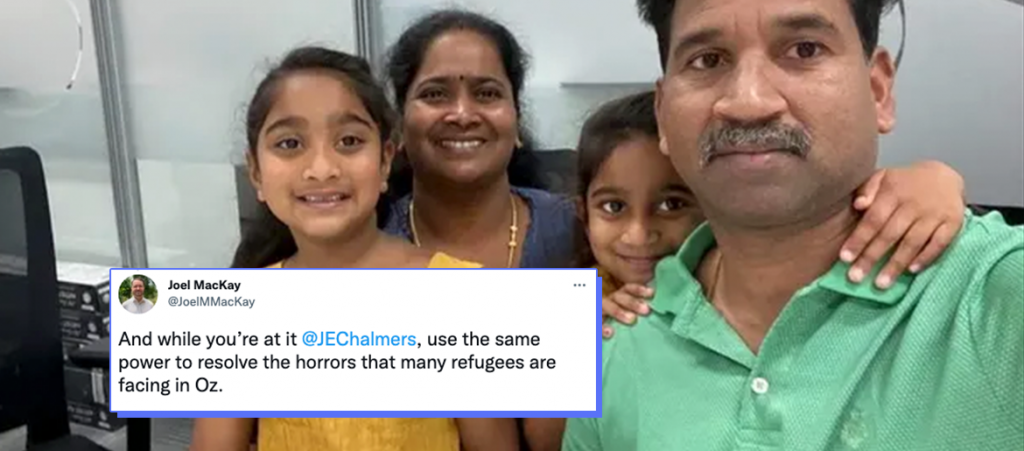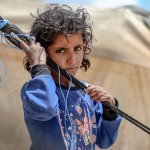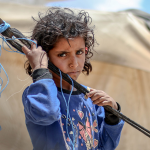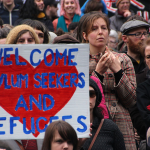
On Friday, we got one of the first pieces of great news since the election. The new Labor government took the first steps to get the Murugappans, a family of Tamil refugees, out of detention and back to their home in Biloela, Queensland. Nadesalingam Murugappan (Nades) and Kokilapathmapriya Nadesalingam (Priya) arrived in Australia by boat, separately, in 2012. They met in 2014, fell in love, and had two children… all the while living under community detention restrictions in Biloela. The family came to national attention in 2018 when the Liberal government moved them to a detention facility, and then attempted to deport them – including the two Australian-born children – in 2019. The community has campaigned loudly for the Murugappans to be brought ‘Home to Bilo’ and it looks like this will happen very soon.
The treatment of the Murugappans within the detention, administration and court system has understandably shocked and outraged Australians. So, once the family are granted the freedom they so deserve… will we simply leave the system that created their situation intact?
What is the path to freedom for the Murugappans?
First things first: the Murugappans have not been granted full freedom in Australia, yet. Interim Home Affairs Minister Jim Chalmers has used his ministerial powers to issue the family a temporary bridging visa. This means they are able to return to Biloela in Queensland in June, while the courts continue to resolve their immigration status.
Keep in mind, this same court system has already repeatedly dismissed Nades and Priya’s asylum claims – including applications to have their cases heard in the High Court. They’ve been placed on temporary visas before, and the previous Liberal government still attempted to deport them more than once.
The Minister (whether Jim Chalmers remains, or someone else is chosen) has the power to arbitrarily grant the entire family permanent residency. And it does seem like the new Labor government will do this – at least, that’s what Prime Minister Anthony Albanese has said.
So it’s (hopefully, potentially) good news for the Murugappans… but what about the others?
Speaking with the Murugappan family about my decision today as interim Home Affairs Minister to enable them to return #HometoBilo, the big-hearted QLD town which has embraced them so warmly #auspol pic.twitter.com/uw6vlZV2co
— Jim Chalmers MP (@JEChalmers) May 27, 2022
How many people are in asylum limbo?
Around 32,000 people are currently in Australia, waiting in an indefinite limbo. They arrived by boat from 2012 to 2013 and are still waiting for the government to arrive at a final decision on their claim to be a refugee. Without this decision, they cannot live freely in Australia (despite having been in the country for almost 10 years).
Approximately 19,000 of those people are on temporary protection visas and have been deemed refugees. Then, according to the Sydney Morning Herald, there are another 9703 people who’s refugee status was ‘rejected’ by the Coalition’s unfair ‘fast-track’ process; and 2249 people who are still waiting for an answer.
To its credit, Labor intends to grant permanent protection to all 19,000 people currently on temporary protection. Their plan for the others caught in limbo is still TBC.
And while you’re at it @JEChalmers, use the same power to resolve the horrors that many refugees are facing in Oz.
— Joel MacKay (@JoelMMacKay) May 27, 2022
We know and have got behind the #BiloelaFamily, but there are many more families out there whose stories we don’t know.
We have to end *all* of the cruelty.
Labor’s plans to continue inhumane policies
It’s nice to see the ALP helping the Murugappans and ending indefinite temporary visas… But the kudos stops there. The new government has committed to keeping Australia’s cruelest immigration policies:
- Turning back asylum seeker boats, if safe to do so;
- For boats that can’t be turned back, holding people in offshore detention centres while processing their claims, and;
- Refusing to settle people who arrive by boat in Australia, instead arranging for them to be re-settled in countries like New Zealand and the US.
Australia is a signatory to the UN’s International Covenant on Civil and Politics Rights (ICCPR), which means we are obligated to “protect the human rights of all asylum seekers… regardless of how or where they arrive.” By treating asylum seekers differently purely based on their method of arrival, the Australian government is in breach of human rights law.
Unless Albanese’s government plans to completely overhaul those policies, he won’t be fulfilling his election night promise of “no one left behind… [and] no one held back.”
The Murugappans are an important symbol
Earlier this year, Novak Djokovic as a somewhat symbolic detainee highlighted two messages: first, that the Australian government doesn’t make ‘exceptions’ for the rich and famous*; and second, that the conditions facing asylum seekers here can be unbelievably unfair and cruel. Djokovic was in hotel detention for days, others had been there for years. Since then, almost all of the people in hotel detention have been released. They are on final departure visas, which means they must ultimately leave Australia.
Did Djokovic and the damning global attention that came with him, prompt Scott Morrison’s government to end that practice? We might never know for sure. But his presence undeniably dragged the problems with hotel detention into full view.
For Nades, Priya and their daughters, their priority is to get home to Biloela and make sure their lives in Australia are guaranteed. But their story is already symbolic for the rest of us. Given the opportunity, they became a beloved part of their community. That community campaigned passionately for them, generating support across Australia.
What about the people and families who haven’t yet had the opportunity to become part of our community? For those already here, whose stories haven’t cut through the media for whatever reason, or for those who are trying to find a way to cross oceans and skies for a better life. Will we continue to apply the pressure after the Murugappans have settled, to improve Australia’s treatment of asylum seekers across the board? If we let ourselves be content with achieving a happy outcome for one family only, our support will have been as arbitrary as a Minister’s intervention.
*Of course, we know the government absolutely does make exceptions for the rich and famous… but that’s for a different article!




Comments are closed.